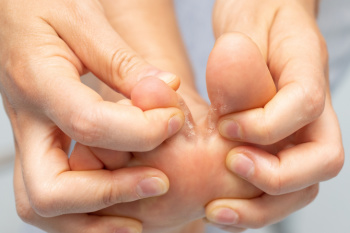 Athlete's foot, medically known as tinea pedis, has a history dating back centuries. Its first documented mention dates to ancient Egypt, where papyrus scrolls described skin infections resembling the symptoms of modern-day athlete's foot. However, it was not until the 20th century that the condition garnered significant attention. The rise of urbanization, the use of closed shoes with socks that retained moisture, and the increased use of communal bathing facilities during the early 1900s contributed to the widespread occurrence of athlete's foot. Additionally, the damp and unsanitary conditions prevalent during World Wars I and II facilitated its rapid spread among soldiers in trenches and barracks. Despite advancements in hygiene and healthcare, athlete's foot remains a prevalent issue today. The fungus thrives in warm, moist environments such as locker rooms and swimming pools. If left untreated, it can lead to discomfort, itching, and skin breakdown. If you think you have athlete’s foot, it is suggested that you schedule an appointment with a podiatrist for guidance in managing this condition.
Athlete's foot, medically known as tinea pedis, has a history dating back centuries. Its first documented mention dates to ancient Egypt, where papyrus scrolls described skin infections resembling the symptoms of modern-day athlete's foot. However, it was not until the 20th century that the condition garnered significant attention. The rise of urbanization, the use of closed shoes with socks that retained moisture, and the increased use of communal bathing facilities during the early 1900s contributed to the widespread occurrence of athlete's foot. Additionally, the damp and unsanitary conditions prevalent during World Wars I and II facilitated its rapid spread among soldiers in trenches and barracks. Despite advancements in hygiene and healthcare, athlete's foot remains a prevalent issue today. The fungus thrives in warm, moist environments such as locker rooms and swimming pools. If left untreated, it can lead to discomfort, itching, and skin breakdown. If you think you have athlete’s foot, it is suggested that you schedule an appointment with a podiatrist for guidance in managing this condition.
Athlete’s foot is an inconvenient condition that can be easily reduced with the proper treatment. If you have any concerns about your feet and ankles, contact Lawrence Fallat, DPM from Michigan. Our doctor will treat your foot and ankle needs.
Athlete’s Foot: The Sole Story
Athlete's foot, also known as tinea pedis, can be an extremely contagious foot infection. It is commonly contracted in public changing areas and bathrooms, dormitory style living quarters, around locker rooms and public swimming pools, or anywhere your feet often come into contact with other people.
Solutions to Combat Athlete’s Foot
- Hydrate your feet by using lotion
- Exfoliate
- Buff off nails
- Use of anti-fungal products
- Examine your feet and visit your doctor if any suspicious blisters or cuts develop
Athlete’s foot can cause many irritating symptoms such as dry and flaking skin, itching, and redness. Some more severe symptoms can include bleeding and cracked skin, intense itching and burning, and even pain when walking. In the worst cases, Athlete’s foot can cause blistering as well. Speak to your podiatrist for a better understanding of the different causes of Athlete’s foot, as well as help in determining which treatment options are best for you.
If you have any questions please feel free to contact our offices located in Canton and Taylor, MI . We offer the newest diagnostic and treatment technologies for all your foot and ankle needs.
